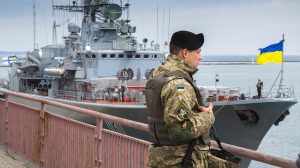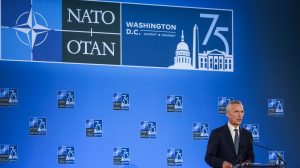Catch up quickly with the stories from Central and Eastern Europe that matter, this week led by a new EU agreement granting Ukrainian food producers tariff-free access to its markets.
Russia’s war on Ukraine
The European Union reached a provisional agreement on Wednesday to grant Ukrainian food producers tariff-free access to its markets until June 2025, albeit with new limits on imports of grains.
The European Commission proposed in January to suspend duties and quotas on Ukrainian farm produce for a further year, with an “emergency brake” for poultry, eggs and sugar leading to tariffs if imports exceed the average levels of 2022 and 2023.
However, after months of protests from farmers over EU environmental rules and cheap imports, EU lawmakers pushed to extend the emergency list to other farm produce and add 2021 as a reference year. This was before Russia’s invasion, when Ukrainian exports to the EU were curbed by tariffs and quotas.
Negotiators for the European Parliament and the Belgian EU presidency agreed in the early hours of Wednesday to add oats, maize, groats and honey to the list, while keeping the limit as the average of 2022 and 2023 imports.
Ukraine’s EU neighbours—Bulgaria, Hungary, Poland, Romania and Slovakia—have complained that the farm imports have upset their producers, leading to farmer protests and import bans. Shipments into those countries increased after Russia’s invasion of Ukraine hindered exports via the traditional Black Sea route.
Czechia on Tuesday said that it is on the verge of delivering thousands of extra artillery shells to Ukraine, just weeks after it announced an initiative to source the much-needed supplies from outside the EU.
Its foreign minister, Jan Lipavský, said it had so far secured 300,000 shells and that the ammunition would provide a vital “few months’ breathing space” on the frontline. Sources added that the first deliveries would come before June.
“We have a direct experience with 40 years of being a satellite of Moscow, being a country which was invaded in 1968 by Russian tanks to curb the Prague Spring,” said Lipavský, adding that his country could not stand by and watch Ukraine go without help. “No one really wants to bring back those [Soviet] times, and I have to say that the population is very sensitive to that.”
Ukraine has said it is falling short of ammunition against Russia; the EU has said it expects to meet only 52 per cent of a target set last year to deliver a million shells by March, and a bill to fund US military aid to Kyiv has been held up in Congress.
On Monday, Polish President Andrzej Duda warned that NATO must urgently increase its defence spending to ensure it does not become the next target of a Russian attack.
Speaking to CNBC, Duda reiterated his calls for NATO members to increase their military contributions to three per cent amid new reports that Moscow could be readying to target the military alliance within two to three years.
Citing unspecified German research, Duda said new evidence suggested that Russian President Vladimir Putin is doubling down on his shift toward a war economy with a view to attacking NATO in 2026 or 2027.
It follows Danish intelligence reports from February which suggested that Moscow could launch an attack on NATO within three to five years. CNBC was unable to verify the contents of either report.
“The alarm bells are ringing,” Duda said, adding that it was therefore more critical than ever to ramp up the alliance’s military investment, describing his increased spending targets as “common sense.”
Other news from the region
Bulgaria’s two largest political parties this week failed to reach agreement on a new power-sharing cabinet, opening the way for possible snap elections in the European Union country with a history of political instability. Prime Minister Nikolay Denkov, from the liberal PP-DB party, resigned this month ahead of a planned rotation with Bulgaria’s former EU commissioner for innovation Mariya Gabriel from the centre-right GERB party. But negotiations between the two partners stumbled on Tuesday over the share-out of posts in the new government.
Slovaks vote in the first round of a presidential election on Sunday, with Peter Pellegrini—a former prime minister and now coalition partner of nationalist PM Robert Fico—expected to advance to a run-off on April 6 with Ivan Korčok, a pro-Western former diplomat and ex-minister of foreign affairs. Both poll between 35 and 40 per cent. The incumbent president, Zuzana Čaputová, a standard bearer for liberal politics in Central Europe, is not running for a second term. Slovakia’s president has a largely ceremonial role, but can delay legislation through constitutional reviews and can appoint and dismiss senior judges.
The Slovak economy has proved relatively resilient to the energy crisis following Russia’s war of aggression against Ukraine and inflation has now declined substantially. However, the country’s export-oriented economy remains vulnerable to external shocks, according to the latest OECD Economic Survey, published this week. The OECD is projecting GDP growth to pick up to 2.1 per cent in 2024 and 2.6 per cent in 2025 after 1.1 per cent in 2023, and projects a significant reduction in inflation to 3.4 per cent in 2024 and 2.7 per cent in 2025, down from 11 per cent in 2023.
Romania has begun construction of what will eventually be the NATO alliance’s largest European military base, as the transatlantic bloc seeks to bolster its capabilities in the Black Sea region with an eye on Russian activity there. The 2.7 billion US dollars project will expand the Romanian Air Force 57th Air Base Mihail Kogălniceanu, which is located close to the Black Sea port city of Constanța. The new facility will be home to some 10,000 NATO personnel and their families. Romania has long been a key hub for NATO operations in the Black Sea region.
Meanwhile, Romania’s energy ministry this week said it expects to make a preliminary investment decision next year on whether to build a small modular reactor plant (SMR), which could become Europe’s first project using the technology. State-owned nuclear power producer Nuclearelectrica said in 2021 it will partner with US firm NuScale Power to build SMR reactors by 2029 as part of its efforts to boost low-emission power sources. The US Ambassador to Romania, Kathleen Ann Kavalec, said this week that the Romanian project could benefit from US financial support worth four billion US dollars.
Croatia’s president can’t run for prime minister, take part in the upcoming parliamentary election or campaign in favor of an opposition party, unless he resigns immediately from his current post, according to a ruling on Monday from the country’s top court. President Zoran Milanović blasted the Constitutional Court decision, saying: “They did it in a gangster way.” “I will eventually be prime minister, but I won’t tell that gang how,” he said. Milanović last week called a parliamentary election for April 17, but hours later announced that he would run for prime minister on the list of the opposition Social Democrats.
Moldovan President Maia Sandu this week called on lawmakers to organise a referendum on joining the European Union simultaneously with a presidential election in October. Speaking at a news conference in Chișinău, the pro-Western Sandu said merging the two would ensure “as high a turnout as possible,” thus giving the plebiscite more legitimacy. Moldova, which has been seeking to shake off Russia’s decades-long influence, was invited to open accession talks with the EU in 2022. Last week, the bloc’s executive said Moldova had fulfilled six out of nine conditions necessary to start accession negotiations.
Armenia could face a war with Azerbaijan if it does not compromise with Baku and return four Azerbaijani villages it has held since the early 1990s, Prime Minister Nikol Pashinyan said in a video published on Tuesday.Pashinyan was speaking during a meeting on Monday with residents of border areas in northern Armenia’s Tavush region, close to a string of deserted Azerbaijani villages that Yerevan has controlled since the early 1990s. The four villages, which have been uninhabited for over 30 years, are of strategic value to Armenia as they straddle the main road between Yerevan and the Georgian border.
Taiwan’s vice president-elect and former de facto ambassador to Washington, Hsiao Bi-khim, this week made a visit to Czechia following a low-key trip to the United States. Czech Senate speaker Miloš Vystrčil, who visited Taiwan in 2020, on Tuesday posted a picture on his X social media page of him meeting and chatting with Hsiao. Taiwan has no formal diplomatic ties with any European country except the Vatican, but CEE countries have been particularly keen to show support for Taiwan—especially following Russia’s attack of Ukraine—defying Beijing’s anger and lessening Taiwan’s diplomatic isolation.
Georgia have outgrown Europe’s second tier competition and need “stronger opposition”, head coach Richard Cockerill told AFP after Los Lelos won the Rugby Europe Championship for the eighth time in nine years, romping to a 36-10 victory over Portugal in the final. That followed thumping victories over Romania (43-5) and Spain (38-3) as Georgia proved once again that they are a cut above the rest of the European Tier II nations. Cockerill wants World Rugby to provide Georgia with more matches against Tier I nations and the best Tier II teams such as Fiji and Japan—and maybe even a place in the Six Nations.
Unlike many news and information platforms, Emerging Europe is free to read, and always will be. There is no paywall here. We are independent, not affiliated with nor representing any political party or business organisation. We want the very best for emerging Europe, nothing more, nothing less. Your support will help us continue to spread the word about this amazing region.
You can contribute here. Thank you.







Add Comment